A SON OF THE CHURCH
Annexe
« The spirit » of Father de Foucauld
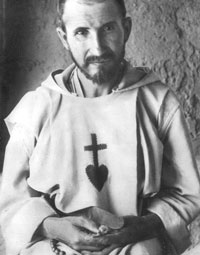
ON 15 September 1958, for the centenary of Blessed Charles de Foucauld’s birth, our Father founded the Community of the Little Brothers of the Sacred Heart under the benevolent crozier of Msgr. Le Couëdic, Bishop of Troyes. We considered nothing other than entering into the pure monastic tradition and becoming missionary monks in accordance with the spirit of Father de Foucauld, our model. (...)
However, our Father had risen up against the Reform of the Church that was undertaken by the Second Vatican Council (1962-1965), and in the meantime we had become the Catholic Counter-Reformation in the twentieth century. (...) The question that can be asked, however, is what is our link with Father de Foucauld? Apparently there is none. We have nothing to do with him. And yet...
The first disagreement with the hierarchy, in particular with our Bishop of Troyes, Msgr. Le Couëdic, was on the issue of Algeria. We wanted it to remain “French”... in conformity with the whole thought and work of Father de Foucauld, but in opposition to the authorities, to General de Gaulle, and to the whole French episcopate that grovelled before him.
The second disagreement arose from the Second Vatican Council, a “ pastoral” council that transformed the Church Triumphant into a “dialoguing” Church, a Church that abandoned converting Muslims in order to “ enter into dialogue” with them. This is contrary to the constant thought of Father de Foucauld, who gave his life for « the conversion of the peoples of the Sahara ».
We can already say that, on these two scores, our Father, and he alone, proved himself to be the true son of Father de Foucauld. First, on the issue of Algeria, he defended French Algeria against its wreckers to such an extent that he was suspended ab officio. Suspensionab officio means that he was deprived of his “office” of vicar and excluded from his parishes, and in connection with this we, his first brothers, were barred admission to Holy Orders.
This freed him from all particular responsibilities, and he found himself available to come to the defence of the universal Church against those who wanted to “reform” it, to the point of being suspended a divinis. This is when he proved himself to be truly a “ universalbrother”, just like Father de Foucauld when he went to the Sahara as a « lost priest ».
I. THE DEFENCE OF ALGERIAN CHRISTENDOM
Our Father wrote to us on November 28, 1961, from his parish of Villemaur, in the fourth year after our foundation:
« It is easier to copy the costume and actions of the saints than to fathom their spirit! But this leads to such disasters! History does not start anew. A saint, in a different climate and in other ways, would know how to give a faithful picture of the universal brother, as he himself had succeeded in doing, while following his own way, in reflecting a faithful picture of Jesus Himself... The best thing is, therefore, to proceed in order, to start from where we are, from where Providence wanted us to be today, and to proceed carefully by following a sure path.
« From the centre of Paris, the road that leads to the desert is firstly Boulevard Saint-Michel; that is the road that must be followed, alongside everyone else, in a crowd directed by traffic policemen. It would be strange to rent a camel for these first kilometres and to wear a Saharan outfit! Likewise, in the Church, people who want to go very far along the path of holiness must not first try to run far from the beaten tracks, in paths other than the thoroughfares taken by all the faithful under the common direction of men of the Church. We must follow in a very ordinary way and for a long time the moral life, common to all, preferably in the most ordinary living environment, the least exciting and strange as possible. This is our current stage, and I thank God our Good Father for having wanted that this Order begin quite simply in a country parish without any real indication of what was to come, if God wants something to come of it. »
Something has come of it. (...) It began with a wholehearted struggle for the defence of French Algeria; so wholehearted was this defence that it hindered successful foundation of the Little Brothers of the Sacred Heart! In these dramatic circumstances Our Father showed that he truly emulated Father de Foucauld.
ECCLESIASTICAL PRISON
On Friday, March 16, 1962, he wrote to us from the major seminary of Troyes, informing us that he was interned there:
« The important matters took place on Wednesday morning. They had been looming for a few days. (...) On Sunday, I declared in my sermon that I did not have any plastic explosives, or a stock of weapons or pamphlets; I was not involved in a plot. But I warned people that if I was put in jail, it would be for having openly declared that the capitulation of M. De Gaulle was the most shameful of our history. »
The following Wednesday, on March 14, four inspectors came to the parish with a search warrant and an order that he be held in custody for questioning. After three hours of searching, « very correct, quite annoyed, ashamed even », they took him away.
There was another round of questioning in Troyes; then our Father spent the evening, night and morning on a bench in the police station! On Thursday evening, there was again another bout of questioning. Finally, our Father wrote a deposition:
« As a priest and a French citizen, I see as a necessity for the homeland, for civilisation and for the Church, that the army win in Algeria. I condemn the perjury and skilful betrayals of the head of state and assert that they are shameful. I rise up against his will to abandon to the cut-throats’ knives our fellow citizens of Algeria, both Muslims and Christians. »
By saying so, our Father followed the path trod by Father de Foucauld, who rose up against the negligence of our colonial administration in 1912: « If France fails to govern the natives of her colony better than she has done, she will lose it, and for these people it will be a step back towards barbarism with the loss of hope for Christianisation for a long time to come. » (Letter to Madame de Bondy, September 21, 1912)
Fifty years later, this prophecy came true, and our Father stigmatised the authorities’ responsibility in the same way:
« I declare unconstitutional, unlawful and immoral all that M. de Gaulle is doing contrary to his duty and contrary to his numerous promises. I refuse this the most shameful capitulation in our history that he is determined to sign. »
The inspector waxed indignant over these « insults to the head of state ». Our Father retorted that the insult was found in General de Gaulle’s acts. The chief of police notified the Prefect who became very angry, but who did not dare hold our Father in internment. He called the Bishop, and they agreed to put him under arrest… in the Major Seminary. (...)
Our Father’s situation was the same as that of Father de Foucauld, who was tied up by the Senoussistes in 1916. There is, however, this aggravating difference: the public and ecclesiastical authorities were the open accomplices of the murderous fellaghas against our Father, who was taking the defence of their victims in Algeria.
A priest from Constantine wrote to him on March 17:
« I have learned through today’s local newspaper that you were arrested for your “pro-French Algeria” feelings. I am anxious to tell you, as a 100 % Pied-Noir (a French colonial born in Algeria) in this French Algeria a land soaked with the blood of too many martyrs since 1830, that I and many of my confreres and our faithful share your sufferings, which are our own, and the injustices that you are undergoing. Because you alone [underlined in the text] are defending the heritage of Christian, French civilisation that our ancestors gave to this country. »
He truly was the only one. This is why the Letters to my Friends experienced incredible growth at that time. But how could a single tree stop the storm?
The fulfilment of the prophecy that Father de Foucauld addressed to captain Pariel in1912 was ineluctable:
« In fifty years’ time [that is, in 1962!] this African empire will be an admirable extension of France. If we treat these people not as children but as material for exploitation, the union which we shall have given them will turn against us and they will throw us into the sea! »
Our Lord did not announce the destruction of Jerusalem with more implacable precision! It is not in vain that Brother Charles wanted to « imitate Our Lord Jesus ».
II. « THE UNIVERSAL BROTHER »
Brother Charles set three objectives for the “ Union of Brothers and Sisters of the Sacred Heart of Jesus” that he wished to found: « Imitate Our Lord Jesus Christ; worship the Holy Eucharist, and work towards the conversion of souls. »
A. IMITATION OF OUR LORD JESUS CHRIST.
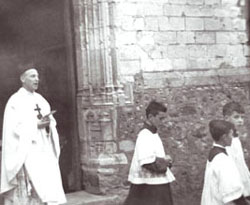
at Villemaur.
From the day of his conversion, Charles de Foucauld sought to imitate Our Lord with a single and very simple intention that is truly in conformity with the mystery of Incarnation. By His Incarnation Jesus, who is divine, descended until He had taken the last place, a place that no one was ever able to take from Him, as Fr. Huvelin used to say.
It can be said that this intention governed Father de Foucauld’s whole life, as was also the case for Fr. de Nantes who wrote to his friends: « by abandoning my position as a professor and just about all the activities that had been my lot up to then, I found myself conducted by Providence to one, or rather three villages on the borders of Champagne and Bourgogne to be their parish priest. I was looking for a certain solitude there, a certain silence that would not be disturbed by the humble ministry in a country parish.
« This is how, on the evening of September 14 [1958], we, a few spiritual sons and I, began the recitation of the Divine Office, and we have not discontinued it since then. The rest of the time, our life goes by peacefully at the presbytery, as in the house of Nazareth. This was at least our wish, our ideal! When they leave [to pursue their studies at the seminary], I will only have to continue at this rhythm that is somewhat austere but quite familiar to the soul and that takes its substance from monastic life and all its exterior from that of a village priest. This life allows one never to wander from Jesus’ will, in thought or in action, that is, if we remain faithful. »
A year later he noted that among his confreres in the diocesan clergy around him « gradually, the teaching of the catechism and preaching, the form of the liturgy and apostolic activities, the ways of feeling and judging are changing in an alarming way ». He denounced progressivism as the cause of this troubling transformation: « a new heresy, far more serious than the worst heresies of former times and one that continues to attract souls simply for want of having been clearly defined and condemned outright. »
A FAMILY TRADITION
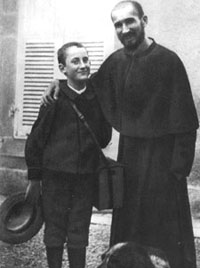
Progressivism is an error concerning the mystery of the Incarnation. (...) We cannot conceive anything more in contradiction with the spirit, the soul and the heart of Father de Foucauld, whose apostolate came straight from love for family and tradition, which were his “wealth”. (...)
This was precisely Fr. de Nantes’ constant thought. He saw his small flock as an extension of his own family, and he exhorted everyone to rediscover the love for his family members and friends, and the fidelity to the traditions to be handed down to children. If someone confessed that he had neither family nor tradition, being one of those helots that modern society produces, he replied: « Well! Let yourself be adopted by Father de Foucauld! »
Now, the family of Charles de Foucauld belonged to the “old French right wing” of the end of the nineteenth century, the legitimist and patriarchal right, that of Mgr Freppel. It had given him the horror of the Revolution: « Everything that smacks of it has always inspired me with a boundless disgust », he wrote to Louis de Foucauld de Lardimalie in 1893. (...)
In his recourse to the cardinal Ottaviani, in 1966, our Father wrote: « If Your Lordship wishes to know the family and religious tradition from which I came, he will read Letter 165, on the death of my father », a meditation before the funeral bier of ship captain Marc de Nantes who « belonged to the Navy as a monk belongs to his Order ».
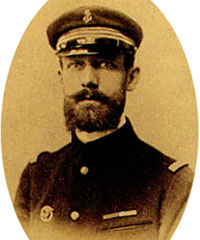
We find in this text a conviction that is similar to that of Charles de Foucauld: “ God and the King”. In accord with it we must fight the Revolution if we want to safeguard the ties between the living and the dead because the Revolution destroys families and their traditions.
Yet there is also this conviction: “ Sailors and missionaries”; that was Marc de Nantes’ « ideal in the 1900’s ». His son could then write:
« We only have to look at this navy blue tunic and this beloved face to see brought to life this great pre-war French navy that made order, civilisation and French peace respected on all seas and in a vast empire opened to our missionaries. »
Such is the paternal inheritance that was transfused into the son from a very young age. (...)
THE LAST PLACE
For Georges de Nantes as well as for Charles de Foucauld the carrying out of this ideal requires one to seek the « last place », following in the footsteps of « Jesus of Nazareth », Son of God, son of David. He chose to be poor « in order to be approachable by all, not to pit one class against another », our Father explains, in contradistinction to Fr. Voillaume’s disciples. Jesus « is Jewish, but He does not share His contemporaries’ humiliated pride, and He was even able to praise pagan Romans or Samaritans. Truly a universal brother, He flatters no one, and His Majesty shows through with all the more brightness from His simplicity and informality. Thus, He annihilates the elite’s vainglory, but does not allow the humble to become swollen with pride.
« This undertaking, which stemmed from God’s charity, also ended in its own dramatic expulsion. »
It is in this that Charles de Foucauld imitates Our Lord Jesus Christ, i.e., in what he used to call his “ abjection ”. After becoming a Trappist at Our Lady of the Snows, he sought to “descend”: from Our Lady of the Snows to Akbes in Syria, then from there to Nazareth as a gardener for Poor Clare nuns in order to be with Jesus and spend his nights contemplating Jesus, not leaving Him even for one moment, thinking only about Him. Then he became a missionary: once he was ordained a priest, he plunged into the South Oran province, then into the Sahara, to perish there as a martyr on December 1, 1916.
Fifty years later, our Father did not have to seek « abjection »; it came on its own. He practiced it as a confessor of the faith, from the opening of the Second Vatican Council on October 11, 1962, a day that saw the triumph within the Church of the progressivismthat he had been relentlessly denouncing for many years as the « Antichrist » struggling against « the mystery of the Church ». Then the « dramatic expulsion took place ».
On May 10, 1963, Msgr. Le Couëdic ordered him to leave not only his parishes of Villemaur, Pâlis and Planty, but the diocese of Troyes as well:
« If we lose all, our Father then wrote to us, if we are despised, chased out, what does it matter, since it is in the service of God and of souls. I love, we all love so much this Truth and this Church; it is for them that we are loathed, and in consequence this martyrdom elicits joy. My sole preoccupation is to remain truly faithful to God’s wisdom and prudence. As for you, my sons, your concern is to embrace my thoughts and decisions. »
He lost all power of jurisdiction, all ecclesiastical office and benefice, but at that price he preserved his freedom to keep on saying the truth and defending the victims of our civil wars, and, above all, the freedom to live the monastic life for which he had founded our community.
It was then that he truly became a « universal brother ». We established ourselves « as lost children of the Church » at Saint-Parres-lès-Vaudes, where we were going to carefully follow events unfolding at the Council at the very moment when they were developing into a tremendous apostasy, at the instigation of Pope Paul VI. But our Father was ready to wage this colossal combat, for the Church.
THE FALSE DISCIPLES
As for the so-called disciples of Father de Foucauld, they had already long since been won over to modern errors. Proof of this is the « total silence » observed by the « officials » today in Algiers, when his upcoming beatification was announced, because it « could reopen the sensitive debate over Christendom in Algeria », reports La Croix. (...)
The foremost among these false disciples was Massignon, who fraudulently passed himself off as the depository of Father de Foucauld’s thought and spirituality by dedicating his life to the study of Muslim “ mysticism”! (...) The truth is that Massignon destroyed the “Catholic Colonial Union” that Father de Foucauld wanted to work for the conversion of the Muslims.
The first congregation that claims to be followers of Father de Foucauld is that of the Little Brothers of Jesus, whom Fr. Voillaume gathered together at El-Abiodh-Sidi-Cheikh in Algeria in 1933. (...) The Brothers began adoring the Blessed Sacrament so that It might “ radiate ”, not only without any military or political support, but also without any goal. At first, our Father thought that it was a mysticism so sublime that he could not understand it. Afterwards he had to face the facts: this so-called “mysticism” was neither religious, nor even Christian, but purely human.
The train of events confirmed this: there is never any mention among them of the salvation of souls as a result of a design to speak no longer of the conversion of the natives. They want to act as though the Eucharist could radiate the Love of Jesus’ Heart without displacing anything, without upsetting anyone, without changing anything – apart from making the Muslims better Muslims!
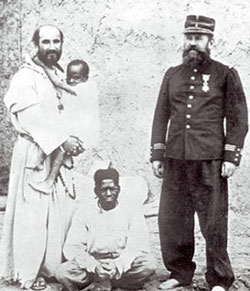
This no longer had anything to do with Father de Foucauld who, right in the midst of relentless persecutions on the part of our secular Republic against the Church, on January 13, 1904 secretly joined Captain Regnault’s Meharist Company (photograph above). He went off towards the southwest for a round of « civilising », in spite of a strict prohibition from the administration, « for the propagation of our Holy Faith and for the extension of the reign of Jesus », in order to dig« the first furrow in which the preaching missionaries will then be thrown as soon as possible ».
Thus, he was a « missionary monk ». This has nothing in common with the supposedly “mystical” phase through which, Massignon, Fr. Voillaume, Fr. Peyriguères, “Little Sister Magdeleine” passed to detach themselves from the earthly, temporal necessities of Christendom in order to reach the pure air of the stratosphere and cross the border at this high altitude only to land in the opposite, anti-colonialist camp. For after the “liberation”, their false, “universal brotherhood” mysticism became the cover for the Marxist, anti-colonial, anti-French, anti-Christian revolution throughout the entire world. We are witnesses to this. We livedthrough it, during our military service in North Africa. While at Tamanrasset, I met the “Little Brothers of Jesus”, who openly worked for the departure of the French army. (...)
Did people like Fr. Voillaume, Sister Magdeleine, foundress of the Little Sisters of Jesus, have the right to establish a congregation completely at odds with all that had existed before them, exactly opposite of Roman Catholic order (...)? Father de Foucauld had Laperrine and his meharists to back him up, without whom he would have been unable to accomplish anything.

The case is closed: Charles de Foucauld dictated the conditions for the salvation of a decadent society; forty years later Georges de Nantes took up this teaching and proposed this model to this same society that has become apostate for want of having listened to Charles de Foucauld and for having turned its back on both the Catholic Faith and the will of Christ.
Both have been banished, excluded. Error has triumphed to the point of taking possession of the name of Father de Foucauld, to the point of claiming to follow his example, to the point of taking advantage of the enthusiasm that he continues to arouse in the young generations, in defiance of his true essence.
Well, must we despair? Humanly speaking, yes, (...) yet how many times has our Father repeated to us, following Father de Foucauld: « Jesus is the Master of the impossible. » In this case, “ the impossible” is not the conversion of the Muslims, something relatively easy, but the conversion of Mgr Teissier. It will be the triumph of the Eucharistic Heart of Jesus, of which the martyrdom of Brother Charles of Jesus is the pledge. Our Father has established his doctrine with a filial fidelity to his spirit and soul.
A DIFFERENT FATHER DE FOUCAULD
It could be asked, however: what relationship is there between the struggle of the Counter-Reformation and that of Father de Foucauld? Here is the answer: in this fight, Fr. de Nantes is to Father de Foucauld what St. Paul is to Our Lord Jesus. (...)
Jesus did not leave any writings, neither did Father de Foucauld. He wrote as a solution for his dryness in prayer, but these thousands of hand-written pages were not intended for publication. Jesus had his Evangelists. Father de Foucauld had in René Bazin his “St. Luke”. He led his investigation, and nothing is able to replace, even today, his “Charles de Foucauld, Explorer of Morocco, Hermit in the Sahara”, which has just been republished.
It is St. Paul, however, who established the theology of the Redemption, of the salvation procured by Jesus Christ, who died as a martyr at the hands of His brothers for the salvation of us, the pagans. Well! Fr. de Nantes, our Father, established that Charles de Foucauld died as a martyr of a mystery of redemptive Incarnation, after having asked this of God for twenty years. This grace of graces was granted to him on December 1, 1916, on the first Friday of the month. The Apostolate of Prayer’s intention for that day happened to be the conversion of Muslims.
This martyrdom was the seal affixed by God on a life passed in continual contemplation of Jesus from its humblest angle. He loved Jesus at the last place, and this is where he wants to rejoin Him. But poor Jesus, humble Jesus, Jesus of Nazareth is also Son of God made man, Our Lord Jesus Christ. It is this “total Christ”, Master of History, whom Fr. de Nantes unceasingly preaches following the example of St. Paul, but in the manner of Brother Charles de Jesus, by placing his entire devotion in the Sacred Heart of Jesus in his motto “ Jesus Caritas ”, and wearing on his chest this Heart surmounted by a Cross.
« It is a human heart, our Father wrote, it is a human will that reintroduces into our human history the law of God, the love of God as a new force everywhere confronted by the forces of evil. It is a divine Fighter who announces the final victory. Jesus is wherever danger is! to fight with us and to conquer. » (CRC n° 64, Jan. 1973, p. 14)
B. DEVOTION TO THE HOLY EUCHARIST
Fr. de Nantes, our Father, is another Father de Foucauld, as St. Paul was another Christ: the same zeal for the defence of Christendom, which had as its incandescent source the same fervent devotion: devotion to the Eucharistic Heart of Jesus, a devotion to the Love that Jesus has in His Heart, a Love entirely directed towards His plan of giving His Body to eat, His Blood to drink and, through the appearances of bread and wine that He gives to them, convincing us that it is our Bread and our Wine of salvation.
This is the entire live of Georges de Nantes, as it was the entire life of Charles de Foucauld, from the day of his conversion when Fr. Huvelin gave him Communion, to the day of his martyrdom that surprised him in adoration before the Blessed Sacrament exposed in the monstrance.
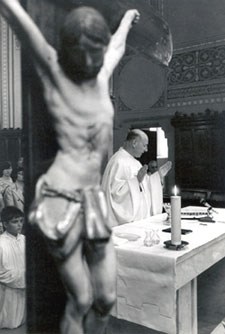 « It is at Mass, by threads more or less invisible, that my whole life has always been held, my morning, my midday and my evening », Fr. de Nantes wrote in the prologue of his Memories and Anecdotes. He was to prove so at the time of the crisis provoked by the introduction of a new Ordo missæ by Pope Paul VI in 1969.
« It is at Mass, by threads more or less invisible, that my whole life has always been held, my morning, my midday and my evening », Fr. de Nantes wrote in the prologue of his Memories and Anecdotes. He was to prove so at the time of the crisis provoked by the introduction of a new Ordo missæ by Pope Paul VI in 1969.
It should not surprise us that he was followed by so few because he alone showed himself to be a “universal brother”. All the others either took a stand for the “new mass” or for the “mass of all times”. He « fought alone » against both sides in order to defend the unique Holy Sacrifice of the Mass « at the Heart of the Church », in medio Ecclesiæ.
« What a terrible battle at the heart of the Church! he observed thirty years ago. The Devil tries to bring about the abolition of the Holy Sacrifice and he fails because Christ, who is stronger than he, will never allow it. But the Devil’s agents at least make every effort to withdraw the faithful from the influence of the Sacrament.
« And here they apparently have great success. They cause the Cross of Christ to be forgotten and they deflect the Church from consciously renewing its mystery. » (CCR n° 52, July 1974 p. 19)
To remedy this, Georges de Nantes did not content himself with only debating. By proposing a « new theology of the Eucharist », his study of the “Holy Mysteries of the Body and Blood of the Lord”, revives the flame that burned in the heart of Charles de Foucauld and passes it on, making the Little Brothers and Sisters of the Sacred Heart « untiring adorers of the Eucharist », as he wrote in Article 13 of our Rule. (...)
« In studying this new theology of the Eucharist, our Father wrote thirty years ago, each one, I hope, will feel that in the eternal youth of Christ’s and the Church’s Sacraments there is a profound truth, an indescribable and simple beauty, a wealth of spiritual life and mystical gifts, which effortlessly reduce all the heresies and all the conservatisms to their nothingness. I confess that in these last ten years of fighting around the altars I have not found a single contemporary theologian to get us out of this rut and thus liberate charity. So, let us do it ourselves. Let us lend a hand and tomorrow we shall see the Eucharist gently ruling over the entire world, which will have been subjugated by the wonder of so great a Sacrament. » (CCR n° 96, p. 6)
C. WORK TOWARDS THE CONVERSION OF SOULS.
Father de Foucauld wrote to Madame de Bondy: « If I were in the place of these unfortunate Muslims who know neither Jesus or His Sacred Heart or Mary our Mother, or the Holy Eucharist…, who know nothing of what makes our happiness here below and our hope above; and if I was aware of my sad state, oh! how I would wish for all to be done to help me out of it! What I would like for myself, I must do for others. »
Thus, he invited his cousin Madame de Bondy to join him in prayer for this intention :
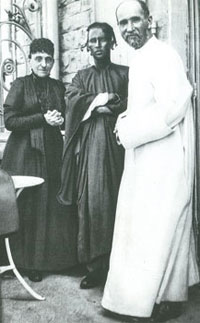
« Pray also for all the Muslims of our empire in North-West Africa, which is now so vast. The present hour is grave for their souls as well as for France. During the eighty years that Algiers has been ours, we have occupied ourselves so little with the salvation of the Muslims’ souls that one could say that we did not occupy ourselves with it at all. We did not occupy ourselves any more with administering them well or civilising them, either. We maintained them in a state of submission, and nothing more. If the Christians of France do not understand that it is their duty to evangelise their colonies, it is a fault for which they will have to account, and it will be the cause of the loss of a mass of souls that could have been saved. » (September 21, 1912)
To prevent this calamity, he undertook a campaign in favour of French Algeria with an « unshakable » faith in the destiny of Christian Algeria:
« May Jesus reign in these places where His past reign is so uncertain! As to the possibility of His reign to come, my faith is unshakable: He shed His Blood for all men. His grace is powerful enough to enlighten all men. “What is impossible with men is possible for God”; He commanded His disciples to go out to all men:“Go throughout the whole world preaching the Gospel to every creature”; and Saint Paul added: “charity hopes for all things”… I hope, therefore, with my whole heart for these Muslims, for these Arabs, for these infidels of every race… » (Letters to Henry de Castries, June 16, 1902. pp. 130-131) (...)
« For the extension of the Holy Gospel, I am ready to go to the ends of the world and to live until Judgement Day ». To this end, at Easter 1908, he drew up the statutes of an association, which he intended to be very pious and supernatural, and which he planned to propagate throughout the Christian world, with the permission of his superiors, in order to attract vocations. It would be a sort of third order, for the conversion of those infidels, for whose colonisation and civilisation we have been made responsible. Since the government had banished priests and religious, he would look for lay people, emulators of the Priscillas and Aquilas of the early Church (Ac 18.2-3)
In 1914, this confraternity, « dedicated to the Sacred Heart », received the title of Catholic Colonial Union.
« God has increased France’s colonial empire in the 20th century to such degree that the French colonies, which numbered three million infidels in 1880, now number fifteen million in 1914. The mother-country has a duty to do everything possible for the evangelisation of these children given her by God. The origin of this confraternity is the need for French Catholics to unite for the fulfilment of this duty. »
The aim is the evangelisation of the infidels of the French colonies. The means is the silent but effective influence of example and prayer, in imitation of Brother Charles of Jesus.
For that, it is necessary « to be converted oneself », to lead an evangelical life, to think like Jesus, « to convert those around us »: in that way one will be a missionary in France and everywhere. To radiate the love of the Heart of Jesus among one’s family and neighbours, whether Christian or not, « less by advice than by example, fraternal affection and goodness […]. To become all things to all men in order to win all for Jesus. »
These orders contain an entire summary of his spirituality and of his own initiative, which consisted in the imitation of Our Lord; the fraternal love of all men: « To see Jesus in every human being; to see a soul to be saved in every soul; to see a child of the Heavenly Father in every man; to be charitable, peaceful, humble and courageous…»
The aim of the Association will be to « make known » the colonies and their needs, to help the apostolic labourers working there, to obtain a good civil administration for these territories without which nothing can be done, to send lay missionaries who will agree to live as expatriates, solidly establishing themselves. On three occasions, in 1909, 1911 and 1913, Brother Charles of Jesus will leave his solitude in order to come to France to found this work and to be its ardent propagator. Each time he will meet with failure. On September 2, 1913, he celebrated Mass in the crypt of the Carmelites, in memory of his great-uncle and his companions, all martyrs of the Revolution of 1792. He implored the grace of martyrdom which he had desired for twenty years, with the foreboding that his work would only succeed at this price.
It could be claimed that the scenario repeated itself fifty years later when Fr. de Nantes campaigned on behalf of French Algeria. He met with the same lack of success, not only because of indifference, but because of treason, this time. We experienced the consequences foreseen by Father de Foucauld, who wrote in 1916:
« My thinking is that if the Muslims of our colonial empire are not converted, there will arise a movement similar to that in Turkey. If we have not succeeded in making Frenchmen of these people, they will chase us out.The only way for them to become Frenchmen is for them to become Christians. » (to Duke de Fitz-James)
Algeria is a poor « French land that is dying in Islamism », he grieved. Now, Islam « reposes on a superficial imposture. It does not withstand instruction. History and philosophy disprove it indisputably… »
Still, in order to understand this, the Koran must be read in the light of the modern historical and critical method that has long been in use in the study of the Bible. Fr. de Nantes is the first to have taken this liberty, and this is where he will command our respect as the true successor of Father de Foucauld.
It may be said that from John Damascene in the eighth century through Peter the Venerable in the twelfth century, to our day, the study of the Koran has constantly been carried out « in an indiscrete manner, as unjustified as it was unscientific », our Father acknowledges.
« Some wanted to prove that this religion was false, therefore valueless. They succeeded only too well because the implausibility, the outrageousness and the coarseness of the hadît (later tradition) provides them with ample cause for controversy, without letting them get to know the Koran itself […]. Others with an opposite cast of mind, make the Koran and Islam into a sort of alibi for their atheism, poorly concealing a constant anti-Christian thought. »
Objecting to both of these attitudes, our Father poses the problem in scientific terms:« It should not be too considerable a task to analyse the Koran, since it is definitely the work of a single author and was written over a thirty year period, whereas the Bible is the written expression of a religious inspiration that affected an entire people during a millennium and more. »
We have been applying ourselves to this since 1958, the year of our foundation. It has led us to conclusions quite far from our original hypotheses and that Fr. de Nantes summarises thus: the author of the Koran « is a religious genius and a man of action of a rare capacity; his work is worthy of being compared with the greatest ». The scientific exegesis of the first five suras allows us to paint a flattering picture:
« A large-tented Himyarite who was a man of letters, a monk, educated at the best Jewish and Christian schools felt an inspiration, a call, a compulsion to manipulate Saint Paul’s demonstration and turn the dialectic of the two Covenants that pitted the offspring of Hagar and Sara against one another to the advantage of Ishmael! »
This discovery offers the basis for a true “dialogue” between Jews, Christians and Muslims, for the future unity of all believers, gathering in the same faith around the same Saviour, Author and Perfecter of our salvation, according to the prayer dear to Father de Foucauld: « My God, if it were possible, may all men go to Heaven! » Amen!
Brother Bruno of Jesus
Taken from He is Risen! n° 30, February 2005